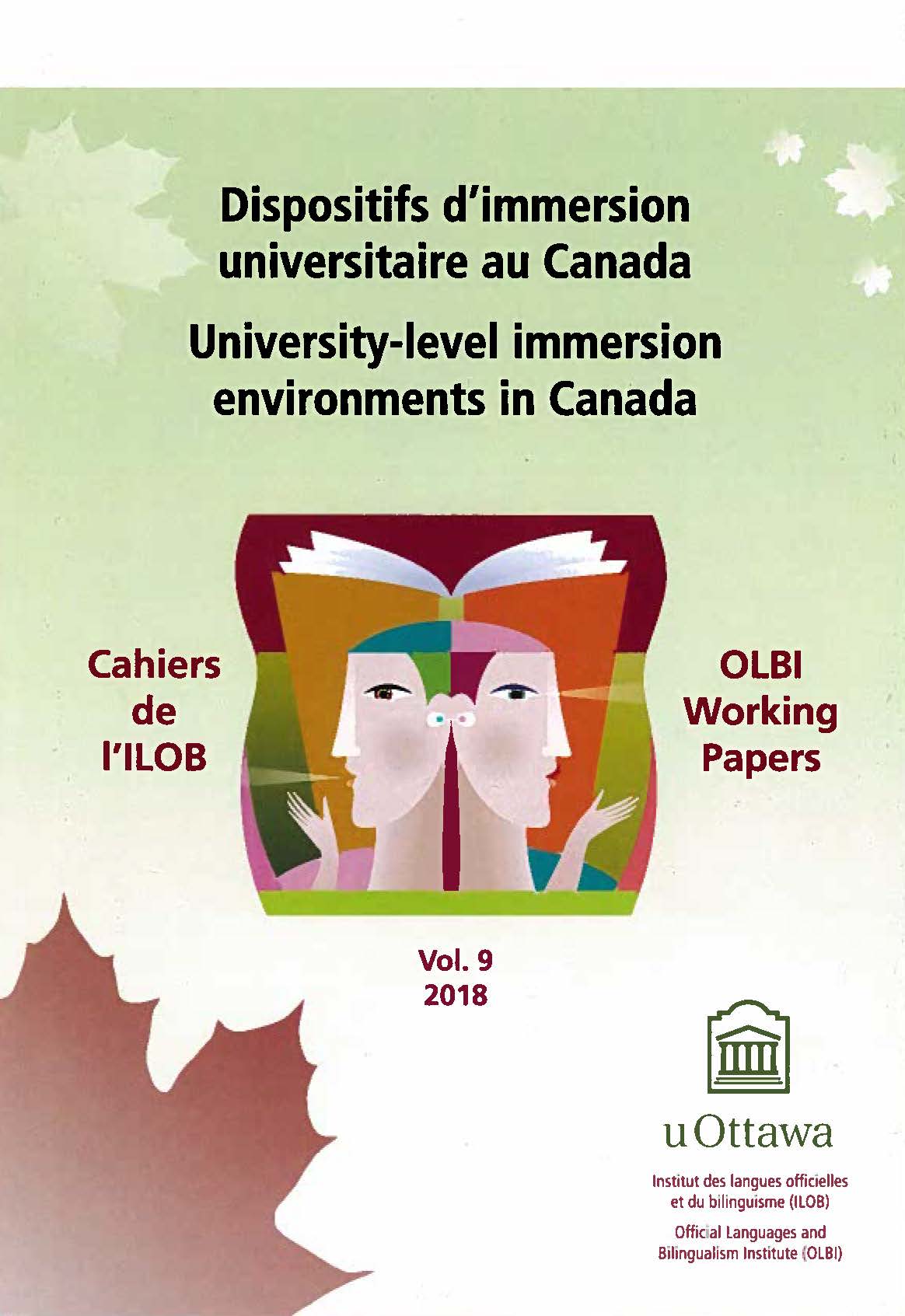Archives
-
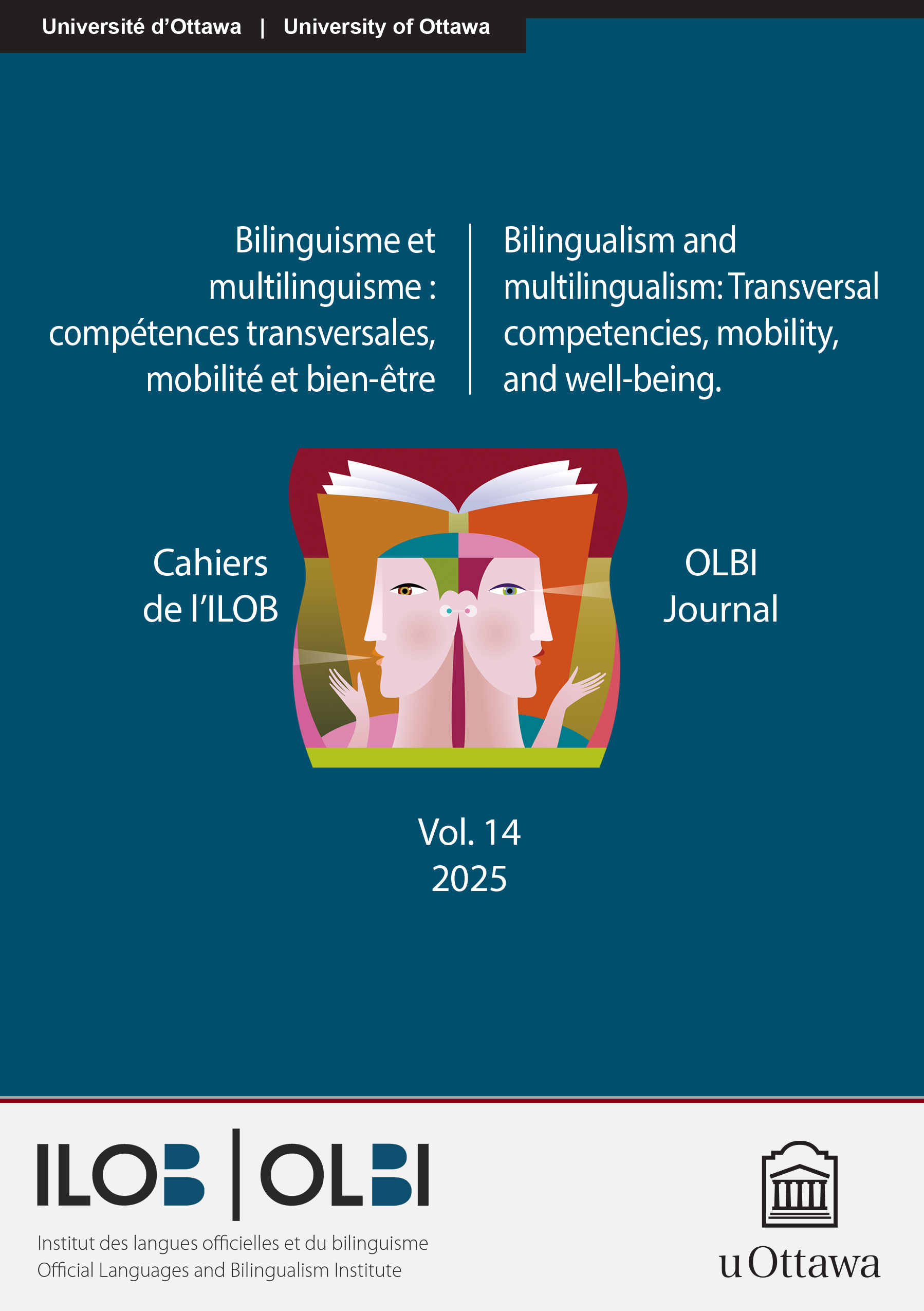
Bilingualism and multilingualism: Transversal competencies, mobility, and well-being
Vol. 14 (2025)Welcome to this volume of selected papers from CCERBAL 2023!
This edition of the CCERBAL Conference took place on May 4–6, 2023, and focused on three distinct, yet interrelated themes: transversal skills, mobility, and well-being in bilingual and multilingual individuals or environments.
Transversality and the new research that is emerging on this topic have solid grounding in the idea of de-compartmentalizing languages, looking at them from new holistic perspectives, and placing them at the centre of learning, workplace interactions, sharing of knowledge, communicating effectively with others, or pursuing responsible citizenship and societal cohesion. The scale, complexity, multidirectionality, and intensity of people’s mobility in our era is unprecedented. This, of course, creates or amplifies multiple questions related to linguistic competences necessary to succeed and thrive in such a context, making the field of language teaching and learning more relevant than ever. The mobility theme also brings to the fore questions related to language, identity, policy, and power as well as the role of big lingua franca languages, such as English, versus the existence and survival of small, local languages in smaller or minority contexts. The well-being theme naturally intersects with the other two and brings positive psychology into the equation. Indeed, looking at how human beings flourish and thrive and relating that to language offers stimulating new avenues that have been explored in recent research and practice.
The articles included in this volume draw on diverse contexts and perspectives to further our knowledge and understanding of transversal skills, mobility, and well-being in bilingual and multilingual individuals or environments.
Guest editors: Pierre-Luc Paquet, Nikolay Slavkov, Nina Woll, Caroline Dault, Laura Ambrosio
-
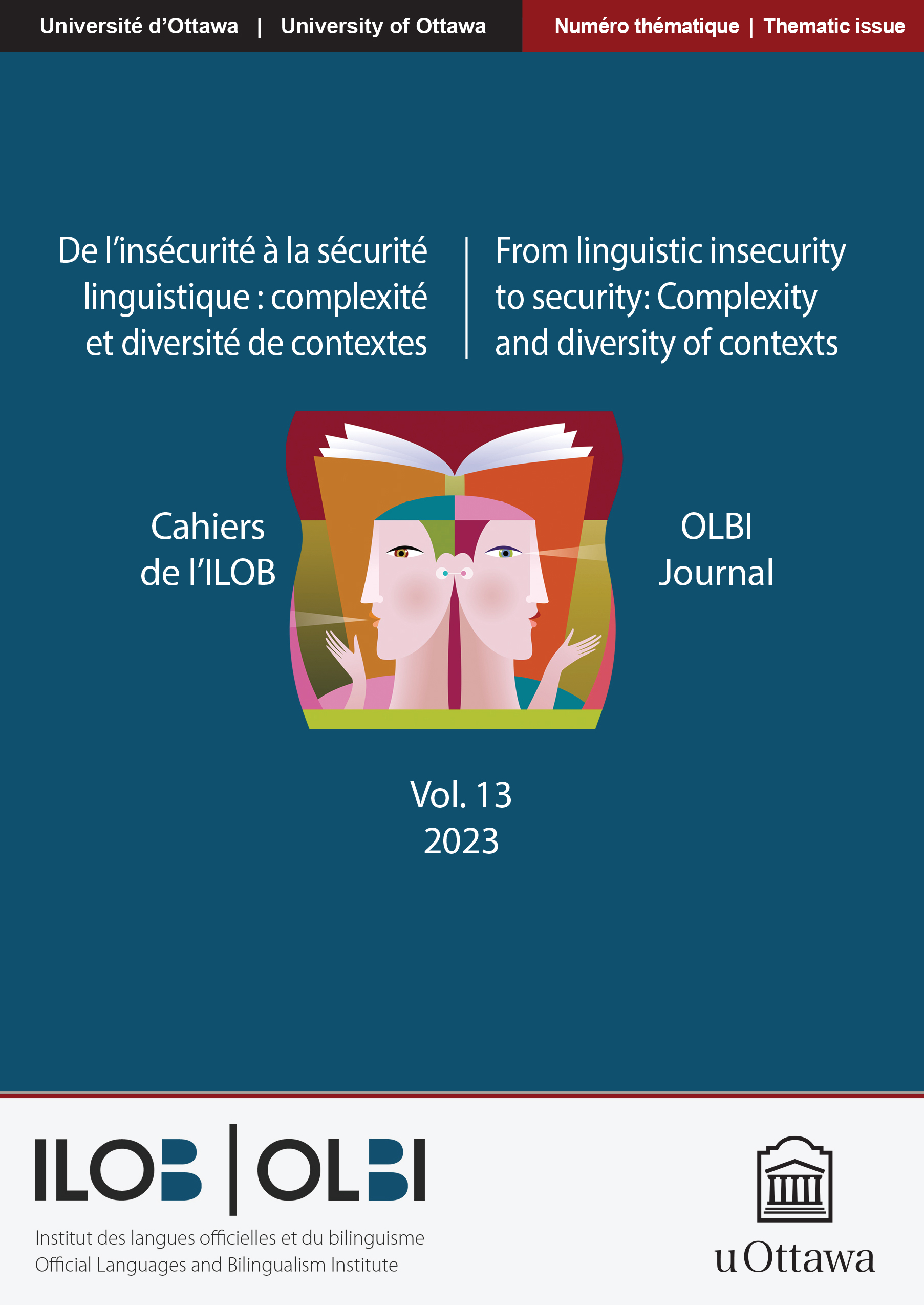
From linguistic insecurity to security: Complexity and diversity of contexts
Vol. 13 (2023)Linguistic insecurity has become an important area of concern in recent years, especially in minority-speaking contexts. This interest can be explained, among other things, by the significant consequences that linguistic insecurity can have on individuals’ language practices, social experiences, and educational pathways, as well as on the linguistic vitality of communities. If social institutions, as levers of power, play a definite role in the emergence, maintenance, and reproduction of linguistic insecurity, they can, in turn, play a role in countering linguistic insecurity. That is why it is essential to look beyond linguistic insecurity and study the policies, discourses, practices, and strategies that promote linguistic security.
The articles in this volume address the issues of linguistic (in)security from several angles, and from a variety of disciplinary perspectives and approaches, highlighting its complexity. The articles illustrate the diversity of contexts and causes of linguistic (in)security, as well as its manifestations and consequences for individuals and communities. Case studies from Canada, the United States, Europe, Africa, and Australia show the universal yet situated nature of linguistic (in)security.
Editors of the volume: Catherine Levasseur, Marie-Eve Bouchard, and Constantin Ntiranyibagira.
-
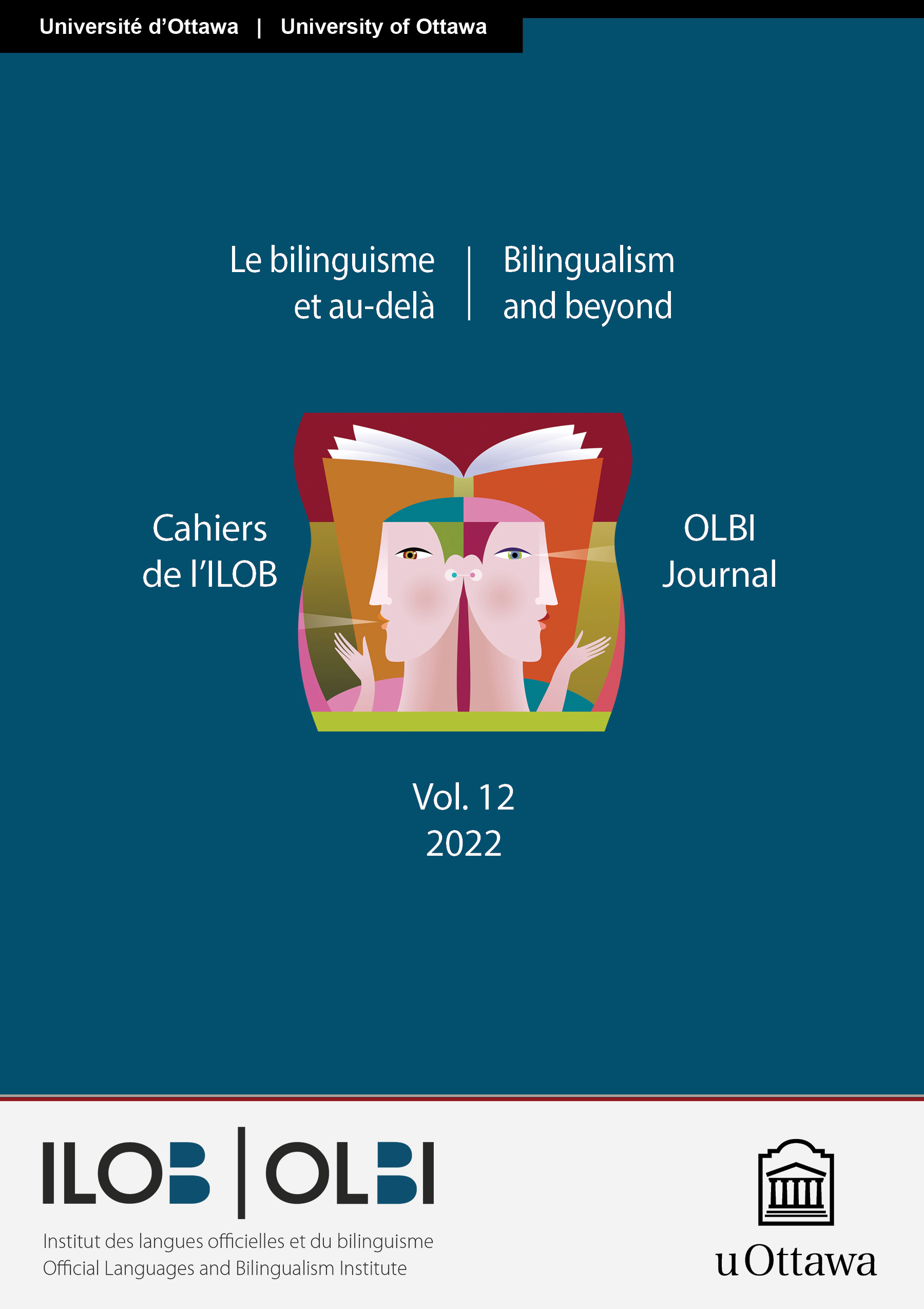
Bilingualism and beyond
Vol. 12 (2022)This volume of the OLBI Journal brings together peer-reviewed papers selected from the 2021 Canadian Centre for Studies and Research on Bilingualism and Language Planning (CCERBAL) conference, hosted online in May 2021 at the Official Languages and Bilingualism Institute of the University of Ottawa. Under the broad theme of Bilingualism and Beyond: Advancing the Thinking on Pedagogies, Policies and Practices, over 275 participants gathered to explore bilingualism, plurilingualism, and multilingualism from various perspectives and disciplines.
The research articles have been grouped under two broad themes: 1) Challenges and opportunities for pluri/multilingual speakers, and 2) Innovative practices in second language education.
Editors: Catherine Levasseur, Keiko Tsuchiya, Emmanouela Tisizi
-
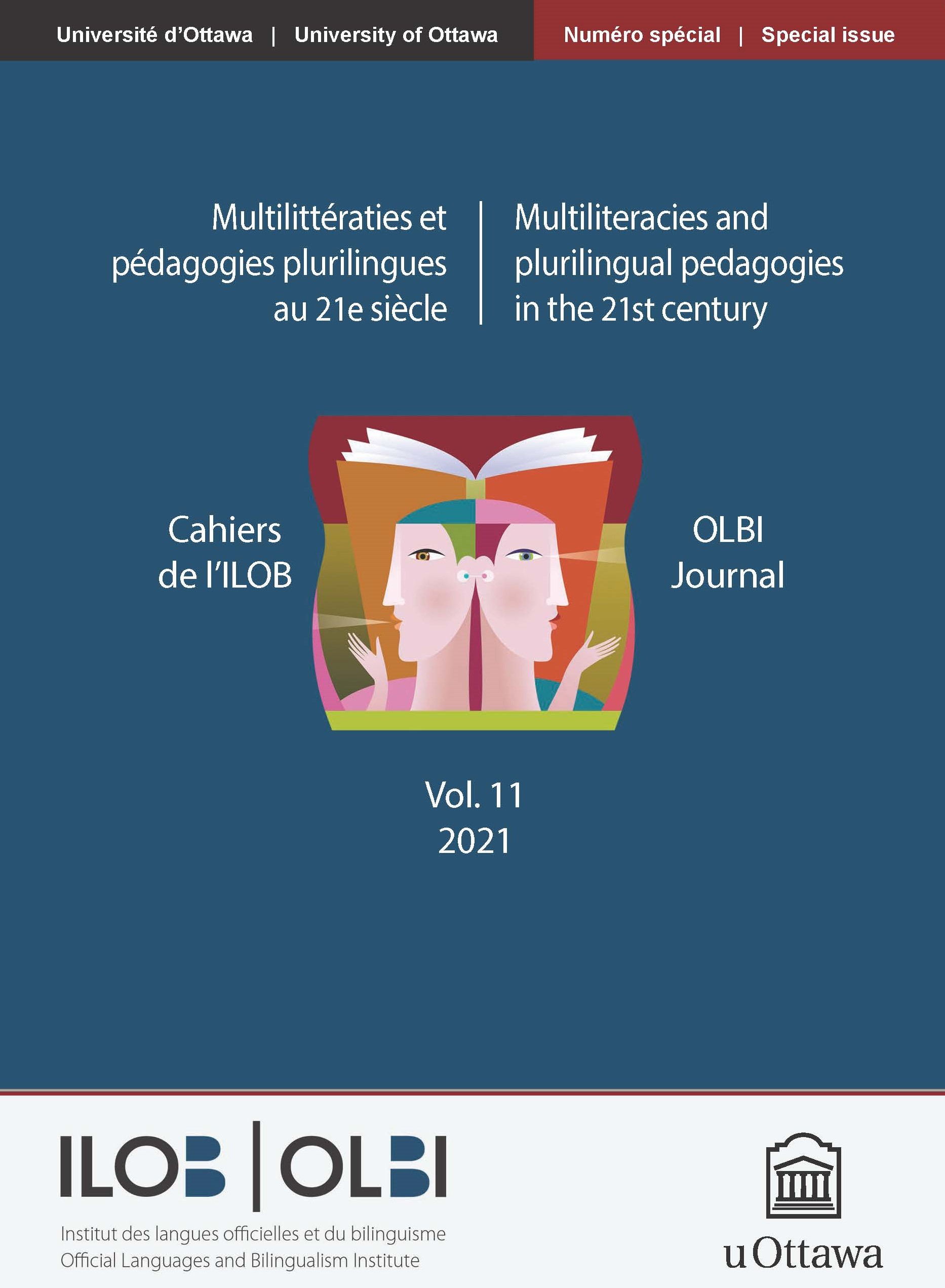
Multiliteracies and Plurilingual Pedagogies in the 21st Century. Critical Responses to the New London Group's 'A Pedagogy of Multiliteracies'
Vol. 11 (2021)OLBI Journal Special issue.
Since the 1996 publication in Harvard Education Review of the seminal paper of the New London Group, ‘A pedagogy of multiliteracies: Designing social futures’, over two decades have elapsed and it is high time we undertook critical reviews of research and pointed out pressing issues and urgent directions of research in this area. Many of the old challenges for literacy education outlined by the New London Group (1996) back then persist today, with some of them further intensified. New developments in society and information communication technology have presented new challenges for language and literacy education. How many of the four principles of the pedagogy of multiliteracies proposed by the New London Group are still relevant or in need of reconceptualization? In this Special Issue, we invite you to consider these questions around four main themes:
1. The plurilingual, trans/languagaging/semiotizing stance
2. The new materiality/posthumanist stance
3. The action-oriented approach
4. Meta-analysing the NLG's founding text.Guest editors: Angel M. Y. Lin, Catherine Levasseur, Geneviève Brisson, Keiko Tsuchiya, Bong-gi Sohn.
-

Translanguaging: Opportunities and Challenges in a Global World
Vol. 10 (2019)TABLE OF CONTENTS:
- Introduction (FR)
- Introduction (EN)
- Translanguaging and Multilingual Academic Literacies: How Do We Translate That into French? Should We? Pour en faire quoi ? (et pourquoi s'en faire?) / Guillaume Gentil
- Conversations autour du plurilinguisme. Théorisation du pluriel et pouvoir des langues / Danièle Moore
- Enabling Translanguaging in the French Language: Classroom Bridging the Gap Between Mutlilingual Perspectives and Multilingual Practice / Michiko Weinmann, Noella Charbonneau
- Translanguaging and Linguistic Landscapes: A Study of Manitoban Schoolscapes / Gail Cormier
- Translanguaging, recours aux langues et aux cultures de la classe autour de la littérature de jeunesse pour des publics allophones d’Ottawa (Canada) et de Montpellier (France) : opportunités et défis pour la classe / Carole Fleuret, Nathalie Auger
- Translanguaging for Cognitive Relief in FL Academic Writing / Ina Alexandra Machura
- Pédagogies de traduction et de translanguaging dans le contexte de l’intercompréhension et de l’enseignement plurilingue / Cedric Joseph Oliva, Clorinda Donato, Francesca Ricciardelli
- “We are all (potential) plurilinguals”: Plurilingualism as an Overarching, Holistic Concept / Enrica Piccardo
- Translanguaging et intercompréhension - deux approches à la diversité linguistique ? / Philipp Schwender, Christina Reissner
- Translanguaging and Multilingual Texts as a Resource in Superdiverse Classrooms / Lena Schwarzl, Eva Vetter
- Bridging Teaching, Learning and Assessment Processes through a Reflective Method: Implications for Plurilingual Learning Environments / Barbara Spinelli
- Translanguaging and the No Voice Policy in L2 Sign Language Contexts / Josée-Anna Tanner, Nina Doré
- Trois modalités de réseaux littéraires pour enseigner la grammaire en contexte plurilingue / Joël Thibeault
-

Language Immersion as Formal and Informal Learning: New Perspectives
Vol. 1 No. 1 (2010)This first issue offers you six articles - two in French and four in English. These articles feature three facets of teaching or learning native, foreign or second languages.

